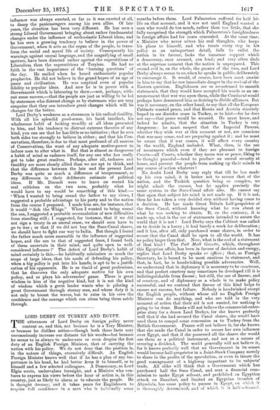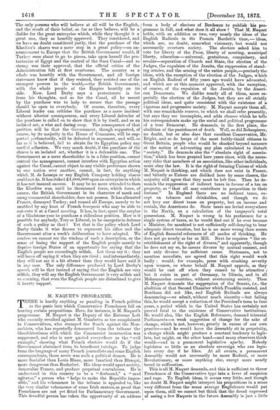LORD DERBY ON TURKEY AND EGYPT. months before them. Lord
Palmerston suffered for half his life on that account, and it was not until England wanted a man who would do too much, rather than too little, that she fully recognised the strength which Palmerston's farsightedness in foreign affairs had for years concealed. At the same time, a Minister who never utters his real thoughts, who keeps his plans to himself, and who treats every step in his policy as an unimportant detail, fails to enlist the nation in its favour, lacks the immense support which a democracy, once aroused, can lend; and very often finds at the supreme moment that the nation is unprepared. This second evil is, on the whole, the greater of the two, and Lord Derby always seems to us, when he speaks in public, deliberately to encourage it. It would, of course, have been most unwise in him to say that he saw immediate danger in the revival of the Eastern question. Englishmen are so accustomed to smooth statements, that they would have accepted his words as an an nouncement that war was upon them, while the Continent would. perhaps have denounced him as desiring to divide alliances. But was it necessary, on the other hand, to say that all the European Cabinets wanted peace, and that Russia and Austria sincerely hoped to see disorder cease in Turkey, or to hint—for he does not say—that peace would be secured. He must know, and indeed he admits, that the situation in Turkey is very dangerous ; he must suspect that the Imperial Powers, whether they wish war at this moment or not, are conscious that war may come, and are preparing against it ; and he must be aware that if war comes, it will affect every country in the world, England included. What, then, is the use of assurances which even if they are pleasant to foreign Courts—all Courts, whether they mean war or peace, liking to be thought peaceful—tend to produce an unreal security at home, and prevent the people from making up their minds to any course of action whatever?
No doubt Lord Derby may reply that till he has made up his own mind, it is better not to arouse that of the nation, and the Turkish question being so complex, we might admit the excuse, but he applies precisely the same system to the Suez-Canal affair also. He cannot say that upon that subject his mind is not made up. If it is not, then lie has taken a very decided step without having come to a decision. He has made Great Britain half-proprietor of the Suez Canal, without knowing what lie was about or what he was seeking to obtain. If, on the contrary, it is made up, what is the use of statements intended to assure the world that it is not ? Lord Derby says the Cabinet was called on to decide in a hurry ; it had barely a week for deliberation ; and it has, after all, only purchased some shares, in order to secure that the Canal shall be open to all the world. It has no policy larger than that. Now, what is the end of a statement of that kind ? The Pall Mall Gazette, which, throughout this Egyptian affair, has been in favour of decision and energy,. replies that Lord Derby speaks ex officio ; that, as Foreign Secretary, he is bound to be most cautious in statement, and that, in fact, he is hoodwinking possible adversaries. Well, we understand that in diplomacy it is necessary to be courteous, and that perfect courtesy may sometimes be developed till it is indistinguishable from finesse ; but still, the use of finesse, and of courtesy, and of diplomacy as a whole is to make policy successful, and we contend that finesse of this kind helps to ensure not success, but failure. Nobody is hoodwinked except the English people, without whose aid no English Foreign Minister can do anything, and who are told in the very. moment of action that their aid is not wanted, for nothing is going to be done. Russia will not believe the commercial-enter- prise story for a dozen Lord Derbys, for she knows perfectly well that if she had secured the Canal shares, she would have- used them to compel some concession as to Turkey from the British Government. France will not believe it, for she knows that she made the Canal in order to secure her own influence over Egypt, and that if she possessed all the shares she would use them as a political instrument, and not as a means of
securing a dividend. The world generally will not believe it, for it knows perfectly well that no Government in its senses would become half-proprietor in a Joint-Stock Company merely to share in the profits of the speculation, or even to insure the good management of a highway important to its subjects' trade. All alike will think that a Government which has purchased half the Suez Canal, and sent a financial com- mission to make Egypt solvent, and prohibited an Egyptian attack on Zanzibar, and limited an Egyptian invasion of Abyssinia, has some policy to pursue in Egypt, on which it is thoroughly determined, and of which it is half-ashamed.
'The only persons who will believe at all will be the English, and the result of their belief, so far as they believe, will be a dislike for the great enterprise which, while they thought it a great one, they so heartily approved. They considered, and we have no doubt considered justly, that the purchase of the Khedive's shares was a mere step in a great policy—an an- nouncement to Europe that the British Government would, if Turkey were about to go to pieces, take upon herself the pro- tectorate of Egypt and the control of the Suez Canal—and so strong was their approval, that the official critics of the Administration felt at first overborne. The country as a -whole was heartily with the Government, and all foreign statesmen knew that if they resisted, they resisted one of the strongest powers in the world,—the British Government, with the whole people of the Empire heartily on its side. Now, Lord Derby says a protectorate is far from his thoughts, and as for the Canal, all he meant by the purchase was to help to secure that the passage should be open to everybody. Of course, therefore, every Liberal leader can criticise the purchase as a mere incident without ulterior consequences, and every Liberal defender of the purchase is called on to show that it is by itself, and as an isolated act, a wise and daring coup. The consequence of that position will be that the Government, though supported, of course, by its majority in the House of Commons, will be sup- ported perfunctorily, will be defeated in argument, and will, so -far as it is believed, fail to obtain for its Egyptian policy any cordial adhesion. We very much doubt, if the purchase of the shares is an isolated act, whether it is a defensible one. The Government as a mere shareholder is in a false position, cannot 'control the management, cannot interfere with Egyptian action against the Canal, cannot object to any visible preference shown to one nation ever another, cannot, in fact, do anything which M. de Lesseps or any English Company holding shares -could not do. Rims risked £4,000,000 upon an enterprise in which it has not insured success. It may be no more attended to than the Khedive was, until he threatened force, which force, of course, the British Government in its character of meek and smug commercial shareholder, does not possess. It has alienated France, dismayed Turkey, and roused all Europe, merely to be snubbed by any knot of French bourgeois who may be able to cut-vote it at a Canal meeting. It has, in fact, spent the surplus of a Gladstone year to purchase a ridiculous position. How is it possible for anybody, Tory or Liberal, to be energetic in defence of such a policy as that ? Yet that is the policy which Lord Derby thinks it wise finesse to represent his office and the Government after a week's deliberation to have adopted. We confess we cannot see the wisdom of such a description, or the sense of losing the support of the English people merely to deprive foreign States of an opportunity for saying that the English people are exceedingly selfish. Let them say it ; they will leave off saying it when they are tired ; and intermediately, they will not say it a bit oftener than they would have said it in any case. The only difference produced by Lord Derby's speech will be that instead of saying that the English are very selfish, they will say the English Government is very selfish and so cunning, that. even the English people are disinclined to give it hearty support.



































 Previous page
Previous page